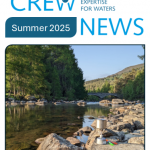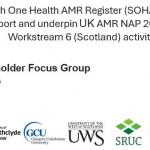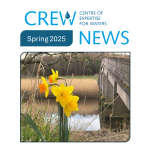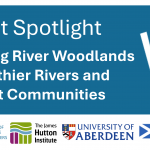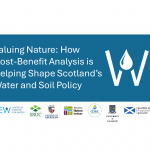Resilience to Fluvial Flooding: Knowns and Unknowns to Recommendations for Management
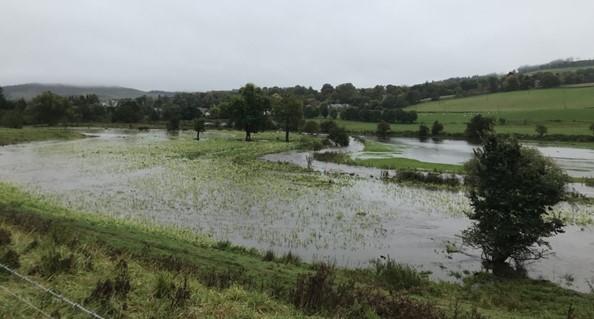
In this Science Policy Fellowship, the research team aimed to critique what we know and don’t know about fluvial flood risk, resilience and management. The research team used the epistemological construct of “known knowns, known unknowns and unknown unknowns” to assess both scientific and stakeholder knowledge. The team conducted a Rapid Evidence Assessment utilising the power of AI to synthesise thousands of papers and to produce network visualisations of keywords and conducted a workshop with key stakeholders. Four themes emerged; 1) Climate Change; 2) Flood Generating Hydrology; 3) Natural Flood Management; and 4) Stakeholder Engagement.
The research team's specific recommendations include:
- Mainstream and upscale NFM implementation, supported by monitoring and maintenance. Ensure NFM is assessed holistically for use alongside hard engineered solutions.
- Contextualize flood management decisions to take into account hydrological complexity, non-linearity, and the unique geography of each catchment.
- Shift to adaptive planning, to account for future uncertainty associated with climate change, including in terms of mindset, economic appraisal, and funding mechanisms.
- Encourage community co-creation of flood management for place-based, socially accepted policies, relating to standard of protection, risk perception, and balance of options.
- Address the many gaps in our knowledge, highlighted by scientific confidence assessments and Unknown Unknowns, which need future research.
CREW Science Policy Fellowships
This project is part of CREW's Science Policy Fellowship workstream which intends to support evidence-based decisions by providing the opportunity for Scotland’s research community to advocate for critical science that addresses upcoming water-related policy, regulatory and/or industry needs. You can read more about CREW Science Policy Fellowships here.
CREW commissioned three Science Policy Fellowships which are aligned to, and support, the development of Scotland’s first Flood Resilience Strategy. Read more about the two other projects here:
Building Public Health Resilience to Fluvial Flooding in Scotland
Policy to Preparedness: Flood Policy and Community Engagement
You can read more about other engagement activity, led by Sniffer working closely with Scottish Flood Forum and ClimatexChange, to support the development of Scotland's first Flood Resileince Strategy here.
Project Outputs (please scroll down for written outputs)
Building Public Health Resilience to Fluvial Flooding in Scotland
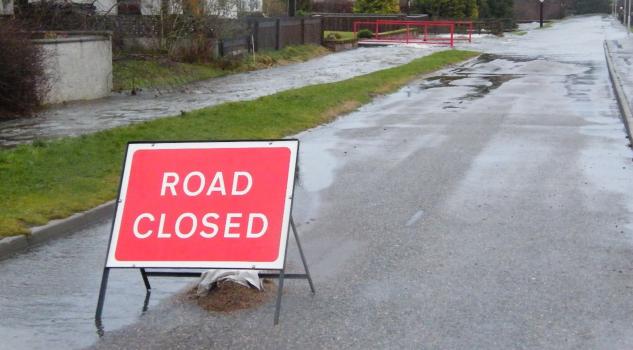
Climate change is increasing our exposure to fluvial flooding in Scotland. Physical and mental health are negatively impacted by flooding, with the greatest health impacts in the UK and Scotland on mental health. This CREW Policy Brief reviews the literature on the public health impacts of fluvial flooding, including physical and mental health impacts, and identifies factors that influence health resilience to flooding.
Key Scottish flood-related and public health policies were analysed to identify knowledge gaps and mechanisms to incorporate public health resilience to fluvial flooding in Scotland. To build health resilience in Scotland the reseach team recommend that further research is undertaken to understand health impacts on vulnerable groups (knowing who, where and when) and to implement this knowledge into localised flood emergency management, as a public health priority.
CREW Science Policy Fellowships
This project is part of CREW's Science Policy Fellowship workstream which intends to support evidence-based decisions by providing the opportunity for Scotland’s research community to advocate for critical science that addresses upcoming water-related policy, regulatory and/or industry needs. You can read more about CREW Science Policy Fellowships here.
CREW commissioned three Science Policy Fellowships which are aligned to, and support, the development of Scotland’s first Flood Resilience Strategy. Read more about the two other projects here:
Policy to Preparedness: Flood Policy and Community Engagement
Resilience to Fluvial Flooding: Knowns and Unknowns to Recommendations to Management
You can read more about other engagement activity, led by Sniffer working closely with Scottish Flood Forum and ClimatexChange, to support the development of Scotland's first Flood Resileince Strategy here.
Project Outputs
Methodologies for sampling fish populations in Scottish freshwater lochs

An understanding of the fish species present and their abundance in Scottish lochs is required for management and conservation purposes, and also to fulfil regulatory requirements. Furthermore, the recent increase in pumped storage hydro-electric development proposals involving large freshwater lochs has the potential to create additional pressures on fish populations. In order to address this, it is important that fish populations are properly assessed during environmental impact assessments and scoping. While a variety of established methods for fish monitoring exist, there is no ’one size fits all’ method, therefore careful consideration is needed in order to determine the best approaches to monitoring. It is therefore important that we have an understanding of the ecological data requirements, and how best to attain these across space and time in order to ensure that fish populations in Scottish freshwater lochs are adequately protected.
The aim of this project was to assess the currently available methodologies for sampling fish populations in Scottish freshwater lochs. Acknowledging the complexity and longstanding challenges with fish monitoring in standing freshwaters, the main objective here was to produce guidelines which support the development of suitable fish assessment programmes.
Project Outputs
Policy to Preparedness: Flood Policy and Community Engagement
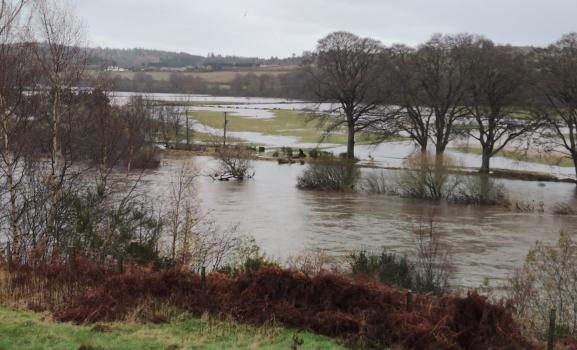
The findings of the report show that recent flood-related policies are beneficially interconnected at regional, Scottish and UK levels. The egalitarian approach evident within them is supportive of climate and social justice. However, while egalitarian policy approaches are the ideal when pursuing climate and social justice, such policies face a complex test when they are implemented amongst existing inequalities in society. The research team found distribution of physical flood risk is not fair nor equal, nor are the social circumstances of many who live on low incomes with limited resources. Recognition of the diversity of circumstances, viewpoints and vunerabilities in Scotland is essential to build place-based sustainable community flood resilience.
CREW Science Policy Fellowships
This project is part of CREW's Science Policy Fellowship workstream which intends to support evidence-based decisions by providing the opportunity for Scotland’s research community to advocate for critical science that addresses upcoming water-related policy, regulatory and/or industry needs. You can read more about CREW Science Policy Fellowships here.
CREW commissioned three Science Policy Fellowships which are aligned to, and support, the development of Scotland’s first Flood Resilience Strategy. Read more about the two other projects here:
Building Public Health Resilience to Fluvial Flooding in Scotland
Resilience to Fluvial Flooding: Knowns and Unknowns to Recommendations to Management
You can read more about other engagement activity, led by Sniffer working closely with Scottish Flood Forum and ClimatexChange, to support the development of Scotland's first Flood Resileince Strategy here.
Project Outputs
CD2024_01 Per- and polyfluoroalkyl substances (PFAS) in drinking water supplies: A review of source, pathway, and fate for selected compounds

CREW Code: CD2024_01
Type of project: Call Down.
Project Status: Project complete. Click here to visit the publication page to view the project outputs.
Overview: This CREW call down project is a follow-on from the CREW project “Developing risk assessment approaches for PFAS and watch list parameters under the recast Drinking Water Directive – PFAS, 17ß-estradiol, nonylphenol” (Vorstius et al., 2024) with a particular focus on per- and polyfluoroalkyl substances (PFAS).
PFAS are a large group of synthetic chemicals with many industrial and domestic applications. In Scotland, a drinking water standard of 0.1 µg/l for the sum of 20 PFAS substances was introduced in January 2023.
Many different PFAS may be present in Scotland due to import and use. Next to PFAS coming from local pollution sources such as landfills, wastewater, and industry uses, they can also be transported through the air over long distances and be brought to land from the ocean on sea spray aerosols. They can reach freshwater directly or move through soils to groundwater and surface water. Which PFAS are found (and relative mixtures) can give an indication where they originate from.
Identifying potential sources of PFAS pollution and analysing available PFAS concentration data helped to better understand where PFAS may be found in Scotland. Higher risk for PFAS pollution was identified for areas in the Northeast, Central Belt, and South of Scotland due to industrial activity and higher population densities, but also for some regions on the West coast. Although measured concentrations of PFAS currently remain well below the drinking water standard, the findings can support a systematic monitoring of higher risk areas to ascertain PFAS pollution in the Scottish environment.
This project has completed. Click here to visit the publication page to view the project outputs.
CRW2023_15 Review of monitoring approaches to deliver healthy ecosystems for Scotland’s protected fresh waters and wetlands
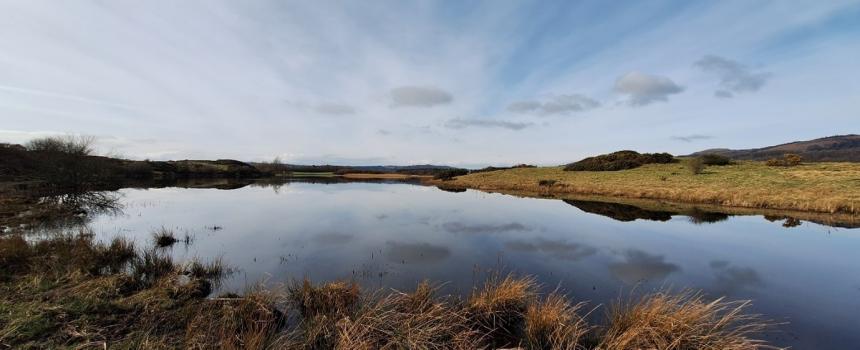
NatureScot is committed to reversing the decline in freshwater biodiversity by protecting and improving ecosystem health in protected areas. This effort aligns with Scotland’s goal to safeguard 30% of its land and sea by 2030. This project makes recommendations on a monitoring framework that would inform management decisions to deliver healthy ecosystems. To achieve this, monitoring efforts must shift toward a broader landscape or catchment-scale approach, providing a more comprehensive understanding of freshwater and wetland ecosystems.
The project recommends developing a multi-index ecosystem assessment framework that will:
- Use indicators of pressures, physicochemical state and biological impact to assess ecosystem health.
- Help decision-makers allocate monitoring resources appropriately to inform the delivery of healthy ecosystems.
- Facilitate data sharing and inter-organisational collaboration to create practical conservation strategies.
The project found that to support this transition, NatureScot can leverage existing tools while exploring new, innovative approaches. The key steps in this transition include:
- Working with monitoring partners to assess the availability, format, and accessibility of existing healthy ecosystem indicator data.
- Building the necessary skills to collate, interpret and apply a wider ecosystems dataset.
- Developing a data integration approach that will synthesis ecosystem data across a range of data types and scales.
- Evaluating the policy, resource, and legislative implications of a new monitoring approach.
This project has completed. Click here to visit the publication page to view the project outputs.
Climate Crisis: informing Scotland’s actionable mitigation and adaptation response to water scarcity
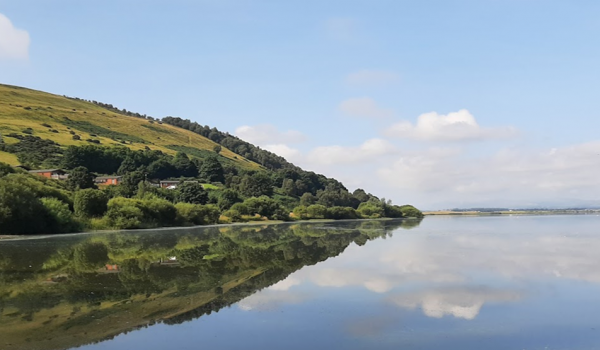
Scotland’s climate is changing at a rate unprecedented in human history. We are becoming exposed to climate related risks, such as water scarcity, that were not considered significant in the past and have not been planned for. The first phase in addressing this shift in risk has been to develop early warning and emergency measures to mitigate the impacts of exceptional events such as the 2018 European drought and its impact in Scotland. However, as we better understand the projected increasing severity and frequency of dry periods and our potential future demands on water supply, an adaptation gap has become evident that risks the security of what has, up until now, been seen as a dependable, high-quality water supply.
In this project the research team review past, present and future changes in water scarcity risk in Scotland. Through engagement with a broad spectrum of stakeholders in the water sector and government agencies the research team asked the questions: 1) What is currently being done to reduce the likelihood and severity of water scarcity? 2) How effective are these strategies now and will they still work under a changing climate future? 3) What additional actions do we need to take to address water scarcity in the future?
In answering these questions, the research team highlight the current challenges in addressing the water scarcity risk and provide recommendations on how to address them. These recommendations are presented as programme of work over the short and long term. To take it forward, the research team propose a governance structure formed of representatives from the relevant agencies and in partnership with businesses and communities. The programme is a prioritised set of recommended actions that would contribute to the delivery of a system of national water resource planning, supported by improved levels of water stewardship from across society. The planning will be informed by better access to water supply and demand information and a programme of research that addresses the evidence gaps and improves knowledge exchange across the water sector.
Previous project page
This project is one of a cluster of CREW water scarcity projects in 2023-2024. For more information please see their project pages:
- CRW2022_05 Understanding the relationship between water scarcity and land use in private water supply catchments - a review
- CRW2023_05 Future predictions of water scarcity in Scotland: impacts to distilleries and agricultural abstractors
Project Outputs
CRW2022_07 Mitigation and adaption response to water scarcity - Project Story Map
Mitigating climate change impacts on the water quality of Scottish standing waters
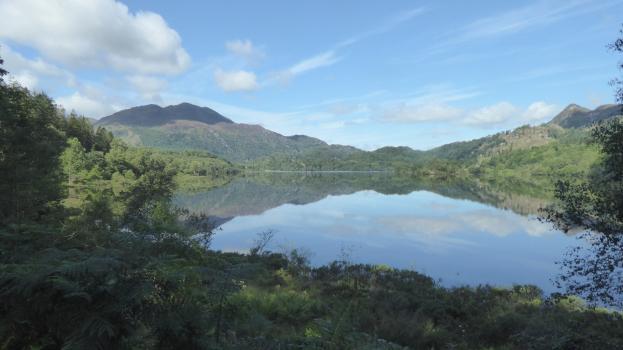
There is a policy focus at national and international levels on mitigating climate change impacts by reducing carbon emissions and increasing carbon sequestration. However, even if we can slow climate change down, we cannot prevent or reverse it. So, alternative approaches must be used to lessen its effects. These include adaptive interventions that increase the resilience, and reduce the vulnerability, of people and nature to weather extremes and other climate change impacts.
Scottish standing waters are already warming at an alarming rate and are projected to continue warming into the future. This is likely to cause more frequent and/or more intense algal blooms unless measures to reduce their growth are put in place. Since we cannot cool our water bodies, and increasing their flushing rates is unlikely to be a widely applicable solution, this study explored other options for reducing the likelihood of algal blooms worsening under climate change. The main aim of this study was to inform fit for purpose strategies for mitigating the effects of climate change on Scottish standing waters.
Previous project page
Project Outputs
Developing risk assessment approaches for PFAS and watch list parameters under the recast Drinking Water Directive

The research project conducted assessments of the potential presence of per- and polyfluoroalkyl substances (PFAS), 17β-estradiol, and nonylphenol for drinking water supply sources in Scotland, to identify high risk areas and enable prioritisation of monitoring and additional knowledge generation.
PFAS, a class of synthetic chemicals produced since the 1940s, are persistent, toxic and bioaccumulative and have been linked to detrimental impacts on childhood development, cancers, and immune system disorders. Nonylphenol and 17β-estradiol are endocrine-disrupting chemicals connected to cancer, reduced fertility and obesity. Due to increasing awareness of the potential occurrence of these substances in the environment, a new standard for PFAS was introduced for Scottish drinking water in January 2023, and Scottish Water commenced a nationwide risk based sampling programme at that time. 17β-estradiol and nonylphenol were added to an EU drinking water watchlist, so Scottish Water will need to monitor for their presence in their supplies when the watch list is adopted in Scotland.
The research project estimated which supplies had the highest potential likelihood of detecting the substances in the raw (pre-treated) water. The assessments identified higher likelihood of PFAS and nonylphenol presence in those areas with higher population and industry densities (predominantly the central belt and east of Scotland), whereas areas with the highest likelihood of 17β-estradiol presence were those under more intensive agricultural use (predominantly the northeast and south of Scotland). Having identified these areas now allows further refinement of monitoring programmes to aid our understanding of the potential presence of the substances, their sources and possible treatment requirements. This in turn will inform best strategies and actions to reduce concentrations of the contaminants if necessary, not only in drinking water, but also in the environment.
NB - Figure 3.4 was updated on 18/03/2024.
Outputs
CRW2023_10 Review of psychoactive substances wastewater monitoring approaches and recommendations for the feasibility of applying different approaches in Scotland.
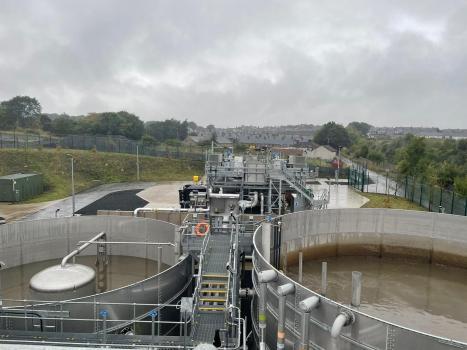
CREW Code: CRW2023_10
Theme: Water Quality and Health
Project status: Project complete. Click here to visit the publication page to view the project outputs.
Type of project: Capacity Building
Lead research team: The James Hutton Institute
Scotland faces a critical public health crisis with one of the highest drug-related death rates in the developed world. Polysubstance use further complicates this issue, creating unpredictable health risks for users. Efforts to address this crisis include the National Drugs Mission Plan (2022–2026), which emphasizes reducing drug-related deaths through improved data collection and harm reduction strategies. The RADAR system (Rapid Action Drug Alerts and Response) plays a pivotal role in providing early warnings about emerging drug trends, such as the rise of potent synthetic opioids like nitazenes, enabling timely policy responses. However, existing approaches to monitor psychoactive substance use are limited by their time-consuming nature and inability to provide real-time data on drug consumption dynamics. Wastewater-Based Epidemiology (WWBE) offers a promising solution by analysing psychoactive substance residues in wastewater to deliver robust, dynamic, and timely insights into drug use patterns. This project explored the feasibility of leveraging Scotland’s existing wastewater monitoring infrastructure to enhance early warning systems like RADAR and support public health initiatives.
This project has completed. Click here to visit the publication page to view the project outputs.


